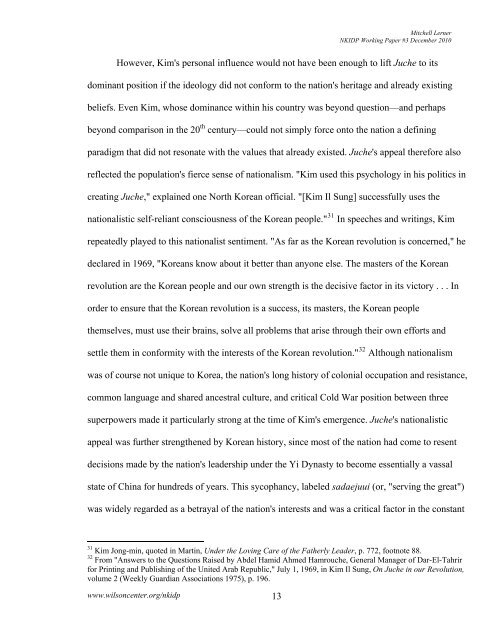"Mostly Propaganda in Nature:" Kim Il Sung, the Juche Ideology, and ...
"Mostly Propaganda in Nature:" Kim Il Sung, the Juche Ideology, and ...
"Mostly Propaganda in Nature:" Kim Il Sung, the Juche Ideology, and ...
You also want an ePaper? Increase the reach of your titles
YUMPU automatically turns print PDFs into web optimized ePapers that Google loves.
Mitchell Lerner<br />
NKIDP Work<strong>in</strong>g Paper #3 December 2010<br />
However, <strong>Kim</strong>'s personal <strong>in</strong>fluence would not have been enough to lift <strong>Juche</strong> to its<br />
dom<strong>in</strong>ant position if <strong>the</strong> ideology did not conform to <strong>the</strong> nation's heritage <strong>and</strong> already exist<strong>in</strong>g<br />
beliefs. Even <strong>Kim</strong>, whose dom<strong>in</strong>ance with<strong>in</strong> his country was beyond question––<strong>and</strong> perhaps<br />
beyond comparison <strong>in</strong> <strong>the</strong> 20 th century––could not simply force onto <strong>the</strong> nation a def<strong>in</strong><strong>in</strong>g<br />
paradigm that did not resonate with <strong>the</strong> values that already existed. <strong>Juche</strong>'s appeal <strong>the</strong>refore also<br />
reflected <strong>the</strong> population's fierce sense of nationalism. "<strong>Kim</strong> used this psychology <strong>in</strong> his politics <strong>in</strong><br />
creat<strong>in</strong>g <strong>Juche</strong>," expla<strong>in</strong>ed one North Korean official. "[<strong>Kim</strong> <strong>Il</strong> <strong>Sung</strong>] successfully uses <strong>the</strong><br />
nationalistic self-reliant consciousness of <strong>the</strong> Korean people." 31 In speeches <strong>and</strong> writ<strong>in</strong>gs, <strong>Kim</strong><br />
repeatedly played to this nationalist sentiment. "As far as <strong>the</strong> Korean revolution is concerned," he<br />
declared <strong>in</strong> 1969, "Koreans know about it better than anyone else. The masters of <strong>the</strong> Korean<br />
revolution are <strong>the</strong> Korean people <strong>and</strong> our own strength is <strong>the</strong> decisive factor <strong>in</strong> its victory . . . In<br />
order to ensure that <strong>the</strong> Korean revolution is a success, its masters, <strong>the</strong> Korean people<br />
<strong>the</strong>mselves, must use <strong>the</strong>ir bra<strong>in</strong>s, solve all problems that arise through <strong>the</strong>ir own efforts <strong>and</strong><br />
settle <strong>the</strong>m <strong>in</strong> conformity with <strong>the</strong> <strong>in</strong>terests of <strong>the</strong> Korean revolution." 32 Although nationalism<br />
was of course not unique to Korea, <strong>the</strong> nation's long history of colonial occupation <strong>and</strong> resistance,<br />
common language <strong>and</strong> shared ancestral culture, <strong>and</strong> critical Cold War position between three<br />
superpowers made it particularly strong at <strong>the</strong> time of <strong>Kim</strong>'s emergence. <strong>Juche</strong>'s nationalistic<br />
appeal was fur<strong>the</strong>r streng<strong>the</strong>ned by Korean history, s<strong>in</strong>ce most of <strong>the</strong> nation had come to resent<br />
decisions made by <strong>the</strong> nation's leadership under <strong>the</strong> Yi Dynasty to become essentially a vassal<br />
state of Ch<strong>in</strong>a for hundreds of years. This sycophancy, labeled sadaejuui (or, "serv<strong>in</strong>g <strong>the</strong> great")<br />
was widely regarded as a betrayal of <strong>the</strong> nation's <strong>in</strong>terests <strong>and</strong> was a critical factor <strong>in</strong> <strong>the</strong> constant<br />
31 <strong>Kim</strong> Jong-m<strong>in</strong>, quoted <strong>in</strong> Mart<strong>in</strong>, Under <strong>the</strong> Lov<strong>in</strong>g Care of <strong>the</strong> Fa<strong>the</strong>rly Leader, p. 772, footnote 88.<br />
32 From "Answers to <strong>the</strong> Questions Raised by Abdel Hamid Ahmed Hamrouche, General Manager of Dar-El-Tahrir<br />
for Pr<strong>in</strong>t<strong>in</strong>g <strong>and</strong> Publish<strong>in</strong>g of <strong>the</strong> United Arab Republic," July 1, 1969, <strong>in</strong> <strong>Kim</strong> <strong>Il</strong> <strong>Sung</strong>, On <strong>Juche</strong> <strong>in</strong> our Revolution,<br />
volume 2 (Weekly Guardian Associations 1975), p. 196.<br />
www.wilsoncenter.org/nkidp 13

















